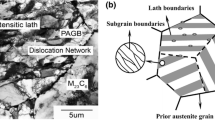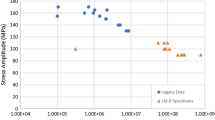Abstract
Fatigue crack initiation in extruded X7091 RSP-P/M aluminum type alloys occurs at grain boundaries at both low and high stresses. By a process of elimination this grain boundary embrittlement was attributed to A12O3 particles formed mainly during atomization and segregated to some grain boundaries. It is not due to the small grain size, to Co2Al9, to 17 precipitates at grain boundaries, nor to a precipitate free zone. Thermomechanical processing after extrusion of X7091 with 0.8 pct Co was done by Alcoa to produce large recrystallized grains. This resulted in initiation of fatigue cracks at slip bands, and the resistance to initiation of fatigue cracks at low stresses was much greater. Microcrack growth is, however, much faster in the thermomechanically treated samples, as well as in ingot alloys, than in extruded and aged X7091.
Similar content being viewed by others
References
J.P. Lyle Jr., and W. S. Cebulak:Metall. Trans. A, 1975, vol. 6A, p. 685.
W. L. Otto, Jr.: “Metallurgical Factors Controlling Structure in High Strength Aluminum P/M Products”, AFML Contract No. F33615-74-C-5077, AFML Report No. TR-76-60, Alcoa Technical Center, Alcoa Center, PA, May 1976.
R. E. Sanders, Jr., W. L. Otto, Jr., and R. J. Bucci: “Fatigue Resistant Aluminum P/M Alloy Development”, AFML Contract No. F33615-77-C-5174, AFML Report No. TR-79-4131, Alcoa Technical Center, Alcoa Center, PA, September 1979.
C. Y. Kung and M. E. Fine:Metall. Trans. A, 1979, vol. 10A, p. 603.
J.P. Lyle Jr., and W. S. Cebulak:Met. Eng. Quarterly, 1974, vol. 14 (1), p. 52.
A. Lawley and M. J. Koczak: “A Fundamental Study of Fatigue in Powder Metallurgy Aluminum Alloys”, Final Technical Report, AFOSR Grant No. 77-3247, Drexel University, Philadelphia, PA, August 1981.
E. A. Starke, and V. W-C. Kuo:Metall. Trans. A, 1983, vol. 14A, p. 435.
R. W. Landgraf,, J. D. Morrow, and T. Endo:J. Materials, JMSLA, 1969, vol. 4, p. 176.
R. E. Peterson:Stress Concentration Design Factors, John Wiley and Sons, New York, NY, 1953, 155 pages.
H. Neuber:Theory of Notch Stresses: Principles for Exact Stress Calculations, Lithoprinted by J. W. Edwards, Ann Arbor, MI, 1946, 180 pages.
E. A. Starke, Jr.: University of Virginia, Department of Materials Science, Charlottesville, VA, private communication, 1982.
E. A. Starke, Jr. and G. Lütjering:Fatigue and Microstructure, M. Meshii, ed., American Society for Metals, Metals Park, OH, 1979, p. 205.
Author information
Authors and Affiliations
Rights and permissions
About this article
Cite this article
Hirose, S., Fine, M.E. Fatigue Crack Initiation and Microcrack Propagation in X7091 Type Aluminum P/M Alloys. Metall Trans A 14, 1189–1197 (1983). https://doi.org/10.1007/BF02659866
Received:
Issue Date:
DOI: https://doi.org/10.1007/BF02659866




